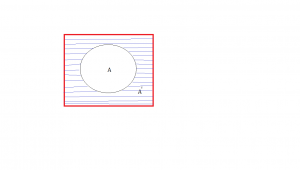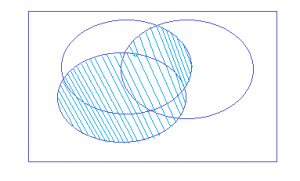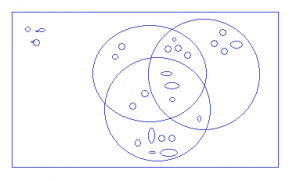Definition :
A set is a collection of mathematical or every kind of elements e.g A = {1,2,3,4,6,Δ,a} .1,2,3,4,6,Δ,a are called elements of the set A and the size of elements is the absolute value of A = !A! (that is the absolute avalue of total number of elements) .In this case the size of A is 7
Operation on sets:
There is a kind of mathematical rules of sets: ∩= Intersection, U= union eg If A and B are sets AUB = is the set of all X such that X is an element of A or X is an element of B A∩B= is the set of all X such that X belongs to A and X belongs to B. Sometimes we can do a kind of venn diagrams to illustrate sets :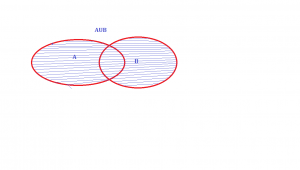 Sometimes all sets belong to a universal set eg the universal set U then A complement is a set of X belonging to U such that X dose not belong to A
Sometimes all sets belong to a universal set eg the universal set U then A complement is a set of X belonging to U such that X dose not belong to A
A U (B ∩ C) = (A U B) ∩(A U C)
That means every thing in A plus every thing in the intersection of B and C
AUBUC = ¦A¦+¦B¦+¦C¦—¦( A∩B)¦—¦A∩C¦—¦B∩C¦+¦A∩ B∩ C¦
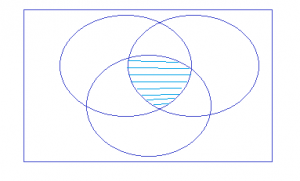 Inclusion/Exclusion Inclusion/ Exclusion for n sets!
Inclusion/Exclusion Inclusion/ Exclusion for n sets!
Ex. Uni foot team has 11 students taking chemistry (C) ,12 students taking mathematics (M),12 students taking physics (P). If 7 take C and P, If 4 take M and P, If 5 take C and M, If 3 take all three, If 3 take none of these.Haw many are in the team?
so without any formulas we have 25(Number) in the union (total =25)
Partition of a set A:
the idea of partition is to subdivide a set in pieces
Def: a partition of the set A is a set of subsets
If C is a subset of B that means if X belongs to C then X belongs to B. the addition of subsets equals the original set
There are conditions to that : all the subsets of A must be disjoint. so A1+A2+A3+…………………………..Ak= A
Ex :
Let’s flip a coin 3 times then the possible outcomes are 8 possibilities (TTT, TTH, THT, THH, HTT, HTH, HHT,HHH) .2×2×2 ( every time there are 2 possibilities) now lets consider a partition :
A0 :{TTT} A1:{TTH,THT,HTT} A2:{THH,HTH, HHT} A3 :{HHH}
AK : set of outcomes with K heads , this is a partition of big set A
Functions:
Suppose that A and B are sets and f(A) that means inputs on element A are the outputs on element B associated with it .
We can define im ( f)={ b belonging to B } For each b we can define the inverse image (b)
